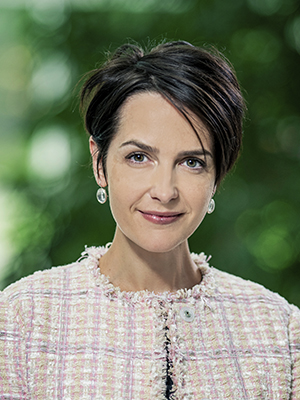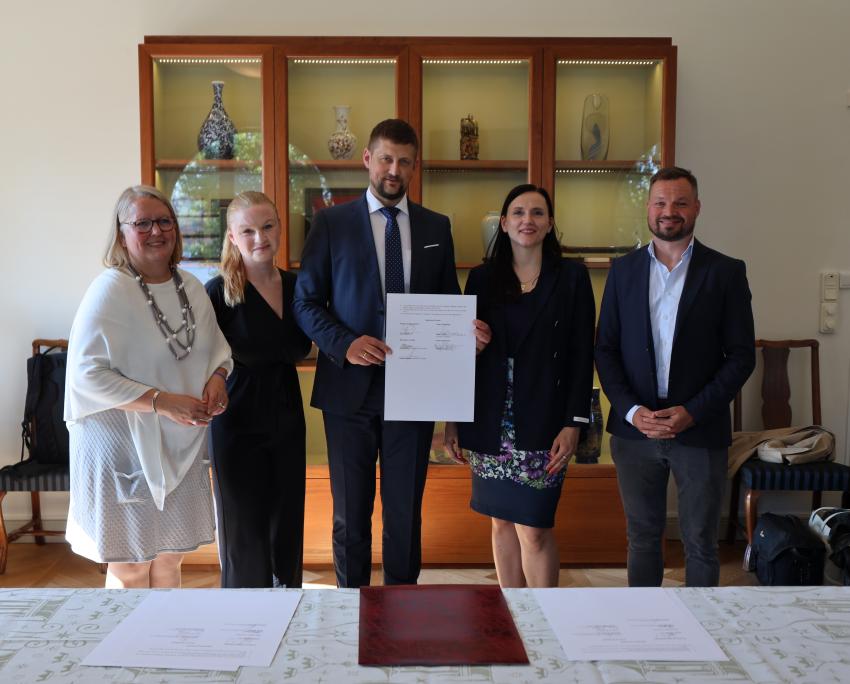A newly signed Memorandum of Understanding between Ports of Stockholm, the Freeport of Riga Authority and Riga Ropax Terminal is the driving force behind a joint application for EU funding to reduce the impact of port activities on the environment and climate in the areas surrounding the passenger terminals in the capital cities. The aim is to build a sustainable foundation for the future reintroduction of the important maritime transport route between the neighbouring countries and to ensure climate neutrality.
At Stockholm City Hall on 14 June, representatives of Ports of Stockholm, the Freeport of Riga Authority and Riga Ropax Terminal signed a Memorandum of Understanding to collaborate and jointly apply to the EU for funding for the project. The collaboration will lead to the further climate and environmental development of the passenger terminals located in the hearts of the respective cities, as well as build confidence in the future reintroduction of shipping services between the two capitals.
“We are very much looking forward to working together with the Freeport of Riga Authority and Riga Ropax Terminal to tackle mutual challenges and explore development opportunities to minimise the environmental impact of cargo transport and passenger services at the Värtahamnen Port. Port terminals with central city locations are of major importance for the flow of both goods and passenger services. In the growing Stockholm, a well-functioning interface between city and port is extremely important,” explains Clara Lindblom, city council responsible for Ports of Stockholm.
Värtahamnen Port is part of a holistically planned and complex environment, where the new Stockholm Royal Seaport buildings and the Värta Terminal combine to form a new waterfront and entrance to Stockholm. This creates added value for both residents and visitors, as well as better accessibility to the city.
The Freeport of Riga Authority and Riga Ropax Terminal are part of a Memorandum of Understanding to improve connectivity between Riga and Stockholm and develop a brand new RoPax terminal in Riga. The collaboration is a significant milestone in the region's transportation sector and is a testament to the commitment of all three parties to drive innovation and growth, and explore possibilities to improve environmental footprint.
As stated by Ansis Zeltins, CEO of the Freeport of Riga Authority, “Riga and Stockholm have a very long-going history of maritime ties. The development of environmentally-friendly and future-oriented passenger infrastructure, as well as the improvement of connectivity within our port, is a key strategic goal for Freeport of Riga. The signing of this Memorandum emphasizes our joint effort to address existing and future environmental challenges, particularly in the scarce Baltic Sea region, while promoting the development of modern port infrastructure and building sustainable and 'green' passenger and freight services between our ports.”
Jūlija Bērziņa, Chair of the Board, as well as Head of the Riga Ropax Terminal project also emphasized, “The team at the Riga Ropax Terminal is thrilled about the signing of this Memorandum and the future cooperation it represents. This is especially significant as we are currently working on the new passenger terminal project in Riga, with a goal of becoming operational and welcoming our first passengers in 2027. This step will enable us to collaborate more closely and leverage European funding to achieve our shared goals, and work together more effectively towards sustainable development, including the potential to expand maritime passenger transport.”
Historically there has been a stable maritime daily connection between Stockholm and the Latvian capital city, Riga. Since 2010 services known as RoPax, carrying both passengers and goods cargo, sailed from the Värta Terminal in Stockholm. Prior to the COVID-19 pandemic an average of just over 700,000 passengers used the sea-route between Stockholm and Riga each year. During the spring of 2020, the shipping company operating the Riga-Stockholm route decided to suspend services due to the severe drop in passenger numbers caused by the pandemic, which made the route unsustainable financially.
The Memorandum of Understanding and the future joint project also aims to fulfil the EU "Fit for 55" goal to reduce net emissions of greenhouse gases by at least 55 percent by the year 2030.
Information for media

- [email protected], +371 670 308 53
- Freeport of Riga Authority
- 12 Kalpaka blvd, Riga, Latvia, LV-1010
 English
English























